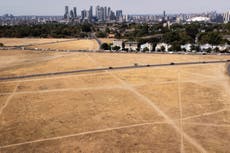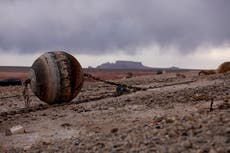Flash flooding hits Las Vegas for second time in two weeks as rain pours into casinos
The slow-moving thunderstorms led to heavy downpours, lightning, and flash flooding
Flash flooding hit Sin City for the second time in two weeks on Thursday as casinos and hotels on the Las Vegas strip were inundated with torrential rain.
The National Weather Service (NWS) issued flash flood warnings for parts of Mohave, Lincoln, east San Bernadino and Clark counties from Thursday until Friday night.
The slow-moving thunderstorms led to heavy downpours, 40mph winds, lightning, and flash flooding.
Videos on social media showed water cascading from the ceiling over gambling tables on the casino floor. One video, shot by Sean Sable inside Planet Hollywood, noted: “You’re not going to believe this, but I’m not sure if it’s raining more inside.”
Footage also showed washed-out roads and underground parking garages filling up with water.
About 17,000 customers were left without power on Thursday, 8NewsNow reported.
At the Harry Reid International Airport, just south of the strip, more than half an inch of rainfall was recorded. It brought the monsoon season total to 1.28 inches, according to the NWS, meaning that 2022 is the wettest monsoon season in a decade with six weeks left to go.
More flooding was possible in the Las Vegas area on Friday. “Scattered slow moving thunderstorms will form during the afternoon and evening hours with the potential for very heavy rainfall and flash flooding,” the NWS warned.
The monsoon season in the US southwest is caused by moisture from the Pacific Ocean moving inland and lasts throughout the summer. But flash floods are becoming more common, and more severe, in the US as the climate crisis worsens, according to a recent study in the journal, Communications Earth and Environment.
Whether or not a flash flood occurs depends on the volume of rainfall and how the geology and topography of the land deal with runoff. More permeable soils, for instance, reduce the likelihood of a flash flood because the ground soaks up more water in a shorter period of time.
Intense storms deluged Las Vegas just two weeks ago on 29th July. Those extreme conditions brought approximately an inch of rain, 55mph winds, and caused power outages in the city. At least four vehicle crashes were attributed to the flooding, according to the Regional Transportation Commission of Southern Nevada.
The recent rainfall is much-needed in the western US which is in the grips of extreme drought.
Lake Mead, which supplies drinking water to Las Vegas and communities across the region, is at a historic low. Intense heat and dried-out vegetation have also led to outbreaks of wildfires.
Drought conditions are expected to worsen in the US southwest as the planet continues to heat up. The region is already in the middle of a 20-year megadrought powered by the climate crisis, making it the driest two decades in at least 1,200 years.
The latest major climate assessment from the United Nations has warned that, on a global level, droughts that occurred once every 10 years are now happening almost twice as often – and will become more frequent as the planet heats up.
Join our commenting forum
Join thought-provoking conversations, follow other Independent readers and see their replies
Comments


Bookmark popover
Removed from bookmarks